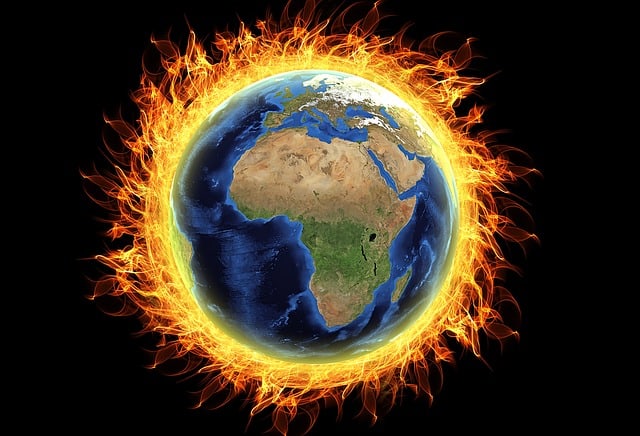Global warming and climate change are terms we often use interchangeably. But they’re actually not the same thing. So, what is global warming? And should we say “global warming” or “climate change” when discussing the need for sustainability?
First, let’s establish some definitions. Climate change is a shift in usual weather patterns. Climate change can happen naturally. Think of the Ice Age. However, today’s climate change is the result of global warming. Global warming is the long-term heating of the Earth’s climate system. Starting in the Industrial Period (which is when large-scale fossil fuel burning began), the Earth’s average global temperature has increased by 1 degree Celsius. For all of human existence, we’ve stayed within this range. Now, not only have we exceeded the maximum of this range, but the Earth’s temperature is now increasing by 0.2 Celsius degrees by decade. Based on current and historic trends, scientists estimate that an increase to 2 degrees Celsius could change life as we know it. The recent IPCC climate report estimates we will reach this threshold in 20 to 30 years if we don’t make serious changes.
We now know global warming causes climate change, which causes extreme weather and other associated consequences. However, global warming also has direct effects. Rising sea levels were the first obvious effect of global warming. As the Earth warms, the ice sheets melt. As the dissolved water empties into our oceans, the ocean’s volume increases, and the sea levels rise. Also as temperatures rise, cities across the world experience heatwaves that cripple infrastructure and put many at risk. Perhaps the most damaging and immediate effect of global warming will be its impact on food and water. Scientists have found that global warming will lead to fewer but stronger storms. This means flash flooding could be a problem in some regions, potentially threatening clean water supplies.
Even though floods and heatwaves are all scary prospects, climate change can be slowed and, to an extent, stopped. Burning fossil fuels predominantly causes global warming; therefore, we must reduce greenhouse gas emissions. According to the scientists behind the IPCC report, we can significantly limit global warming with “strong and sustained reductions in emissions of carbon dioxide and other greenhouse gases.” Immediate and comprehensive action to reduce CO2 emissions would mitigate the worst effects of climate change. Big companies need to make changes in order to lower their carbon footprint. We can also address our own carbon footprints. After all, reducing carbon dioxide emissions requires large-scale change. Our homes use a lot of energy. From electrical appliances to water heating to lighting, most of our daily comforts run on fossil fuels. Switching to renewable energy is ideal, but this isn’t accessible to everyone. Fortunately, there are some very simple actions you can take to reduce your daily footprint, which adds up over time. According to a 2017 study, one action people can take to mitigate climate change is living car-free. Almost one-fourth of an individual’s emissions come from driving. While going 100% car-free isn’t realistic for everyone, reducing how often you drive can still cut your emissions down significantly. Other than that, planting three shade trees can save homes hundreds in energy costs annually. This saves you money and makes your home more energy-efficient. The cattle industry creates a surprising amount of carbon emissions. In fact, the aforementioned 2017 study found a plant-based diet is one of the top ways individuals can help mitigate climate change. However, you don’t have to be 100% vegetarian or vegan to make a difference. By cutting your consumption of animal protein in half, you can reduce your diet’s carbon footprint by more than 40%.
There are so many things that can be done to reduce global warming. If one person does it then another person will do it too. So don’t think that you aren’t going to make a difference. Global warming causes so many bad things to happen so we need to be careful and we need to start doing something.

